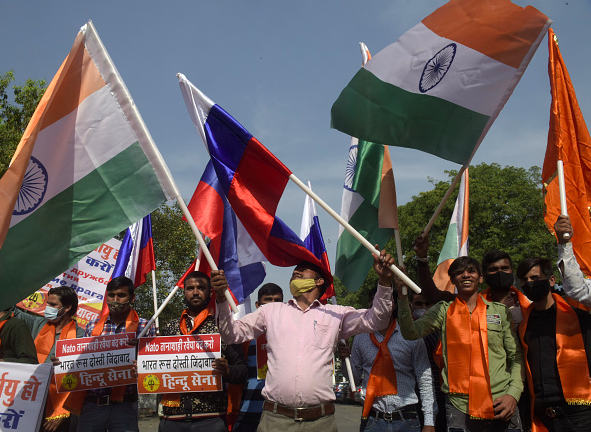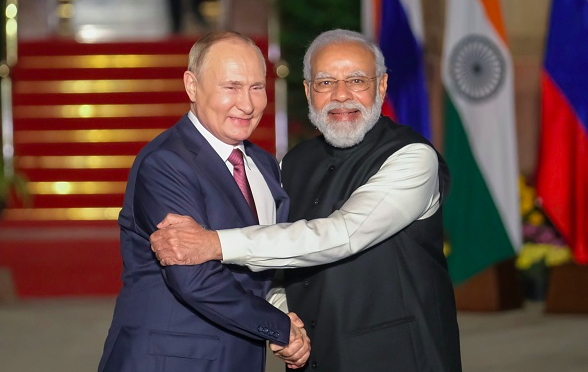
Despite tremendous pressure to condemn Russia for its invasion of Ukraine last year, New Delhi has refused to take a hard line against Moscow. In the year since the invasion, India has displayed a willingness to issue statements favoring peace and diplomatic resolution, but little more. Withstanding international pressure to alienate Russia, India has made the unpopular decision to increase crude oil imports from Russia while the United States and the European Union have imposed sanctions.
This position has been, for the most part, unsurprising. Experts have pointed to numerous reasons behind India’s rationale. Perhaps chief among them is that India and Russia have a long economic, strategic, and diplomatic engagement that New Delhi is reticent to disrupt. Not only is Russia India’s most prominent defense supplier– and has been for many decades – but the two nations have also demonstrated a deep friendship by voting in each other’s favor on several UNSC resolutions. Coupled with India’s historic nonalignment, its continued ties with Russia were expected.
However, another, less-considered aspect shapes India’s stance on the Russia-Ukraine conflict. Namely, Russia’s putative ‘liberation’ of the Russophone regions of Crimea, Luhansk, and Donetsk speaks to a particular irredentist fantasy in India: that of an ‘Akhand Bharat.’ Translated as ‘Undivided India,’ Akhand Bharat is a geopolitical concept that refers to an India which has been ‘reunited’ with regions that were once part of ancient empires on the South Asian subcontinent, including modern-day Pakistan, Afghanistan, Nepal, Bangladesh, Bhutan, Tibet, Sri Lanka, Myanmar, and Maldives. Since the invasion of Ukraine, support for Akhand Bharat has grown in Hindu nationalist circles closely connected to India’s ruling political party.
Shared Irredentist Beliefs
Putin’s statements about the Ukrainian people as ‘family’ and an integral part of Russia’s culture as a sign of Russia’s ambition to reunify the former Soviet regions mirror the ambitions of Akhand Bharat. Like Putin, supporters claim all territories once part of India at various historical points. Putin’s remarks expressing regret at the collapse of the Soviet Union and emphasis on the need for Russia to maintain influence over her neighbors further inspire supporters of Akhand Bharat.
Putin’s remarks expressing regret at the collapse of the Soviet Union and emphasis on the need for Russia to maintain influence over her neighbors further inspire supporters of Akhand Bharat.
Shared ideologies and aggressive territorial objectives have led several groups in India to express support for Russia. Within the first week of the invasion, the Hindu Sena, a Hindu nationalist group whose name translates to “Army of Hindus,” placed posters in prominent parts of New Delhi that read “Jai ho Akhand Russia. Jai Bharat” (“Praise be to an undivided Russia. Praise be to India”). Hindu nationalist support for Russia was even more palpable on social media platforms. The weeks following the invasion of Ukraine saw many Indian tweets favoring an ‘Akhand Russia.’ The hashtags #IStandWithPutin and #IStandWithRussia were trending in India during the early days of the Ukraine conflict.
These statements build on India and Russia’s history of support for each other’s territorial claims. New Delhi has repeatedly abstained from United Nations Security Council (UNSC) votes to condemn Russia’s 2014 invasion of Crimea. Moscow has also supported India’s territorial claims on Jammu and Kashmir, with Khrushchev declaring the disputed region “Indian territory” in 1955 and Moscow supporting New Delhi’s controversial move to revoke the independent status of Jammu and Kashmir in 2019.
Ethnonationalism Support for Irredentism
These irredentist beliefs are underpinned by ethnonationalism in both Russia and India. Just as parallels between Russia’s attempt to reclaim lost glory and establish an ‘Akhand Russia’ resonate strongly with Hindu nationalist ambitions of an ‘Akhand Bharat,’ so does Russian ethnonationalism at large bear many similarities with rising trends in India. Putin’s speeches encouraging the elimination of ‘scum and traitors’ mirror some of India’s Hindu nationalist rhetoric calling for the suppression of religious minorities and political dissenters branded as ‘anti-nationals’ and even termites. Viewed through the lens of Hindu nationalist ambitions, Putin’s invasion and political style are valuable in advancing the objectives of a Hindu-ruled Akhand Bharat.
Other aspects of Russia’s pursuit of lost glory speak to Hindu nationalist desires. For example, Russian narratives that justified the invasion of Ukraine by referencing the genocide of Russian-speaking populations in Ukraine have resonated strongly with majoritarian elements in India. Hindu nationalists falsely proclaim a regional conspiracy of so-called “Hinduphobia” that seeks to oppress or even eliminate Hindus. Further, Hindu supremacists call for the transformation of India from a secular nation into a Hindu Rashtra (Hindu nation), positioning Hindus as the only true territorial claimants of the land. This stance resembles the Russian narrative emphasizing their ties with neighboring countries based on their common Russian roots. Sections of Indian society aligned with Hindu nationalism valorized Putin’s strongman actions and looked toward Indian strongman Prime Minister Modi for similar action.

Hindu nationalist supporters see Putin’s muscular political posture as comparable to Modi, whose government receives considerable support for provocative statements about hostile neighbors and minority populations. Leaders of Hindu nationalist outfits have released statements that applaud Russia for taking decisive action toward safeguarding its borders and resisting foreign aggression. The National President of Hindu Sena Vishnu Gupta stated, “We pray and support Russia getting back their old Soviet Union (Akhand Russia) and taking all necessary action to safeguard their borders. We want the world to know that the Hindus of India stand with Russia and are even ready to fight the war along with them.” Through standing with Russia on the international stage and maintaining trade links, the Indian government has gained significant political mileage domestically.
A Look Ahead
As elections approach, these Hindu nationalists’ irredentist narratives will likely continue. References to Russia in domestic appeals to voters have appeared in the BJP’s election speeches or in Indian media outlets supportive of the BJP, which claim that the prime minister is a leader capable of influencing world events—a belief held, albeit in a more competent manner, by some foreign analysts. While Akhand Bharat is antithetical to the democracy India claims to be, the Hindutva ideology represents a genuine and dangerous ambition to join imperial regions into a single Hindu-led bloc with non-Hindu elements made secondary or even expunged.
An ideological alignment between majoritarian elements in Russia and India also legitimizes the invasion of Ukraine and mobilizes support for similarly aggressive actions in South Asia.
Ultimately, while the Indian public’s support for Putin stems from a perception of a long-enduring relationship and economic and military dependence, realpolitik is not the only factor that shapes domestic endorsement for the Russian invasion of Ukraine. An ideological alignment between majoritarian elements in Russia and India also legitimizes the invasion of Ukraine and mobilizes support for similarly aggressive actions in South Asia. As Russia receives support from large sections of the Indian people, India’s rising ethnonationalism and its consequent democratic backsliding pose serious threats to stability within India and in the region more broadly.
Also Read: Nationalism in Russia’s Bureaucracies: A Cautionary Example for India
***


